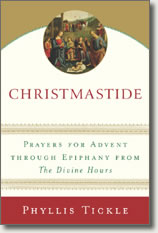The Blessing of Waking and Sleeping
The following reflection first appeared in December 2009 as part of First Sundays with Phyllis Tickle, a series of monthly blogs written by Tickle and posted on explorefaith from 2008 to 2010.
I wake to sleep, and take my waking slow.
I feel my fate in what I cannot fear,
I learn by going where I have to go.
We think by feeling. What is there to know?
I hear my being dance from ear to ear.
I wake to sleep and take my waking slow…..
They are the opening stanzas of “The Waking” by Theodore Roethke, written in 1953 when I was an undergraduate and still naïve enough to think that I might someday also write poetry. That didn’t happen, of course, for the gift of poem-maker was not mine to employ. The gift of lover and appreciator and teacher was, however; and there was no more quintessential a poem born during the years of my time in the sun as student and teacher than Roethke’s “Waking.” Even all these many years later, still it rolls sonorous and handsome and protean in my head and in my soul like the re-assuring, half-heard and half-not-heard, thrashing of the tide when one lives constantly at the edge of an ocean.
More than that, it is December again; and it is in December each year that I most fully plumb the magnitude of Roethke’s words. December’s nights are long and her dawns slow and soft. In that twilight time between first rousing and final waking, between the opening prayers of six o’clock and my submission to the new day’s assignments, my being, like Roethke’s, dances from ear to ear. And it is in December that I most completely grasp the truth that I have slept in order that I might wake and that I must take my waking slow lest I interrupt my soul as it goes half-dreaming to its Source.
There would be little more than that to say of December’s long time of sleeping and waking, I suppose, were it not for December’s festival … there would be little more, in other words, were it not for those carols of peace on earth and good will to men. For what December brings me each year is the renewed and sure acknowledgement that the soul’s need for waking to sleep and sleeping to wake can only be satisfied when the body’s rhythms are allowed to flow, like the tides themselves, uninterrupted and undisturbed. Until all men and women and children can sleep and wake and then sleep again unhindered, until all who wish to do so can dwell safely awhile each day in the luminous space, there can be no completion or fullness of being for us creatures.
Whether it be the bitter cold of homelessness that rouses one prematurely or the terror of guns that keeps the invaded always half-startled and distracted, there can be no waking to sleep nor sleeping to wake for those of us who are so interrupted. And for me, all this fifty-plus years later, peace’s definition is still Roethke’s. Peace is the state of knowing that when, lying in our own beds, every one of us can wake to sleep and sleep to wake, hearing our being as it dances from ear to ear.
Copyright © 2009 Phyllis Tickle
